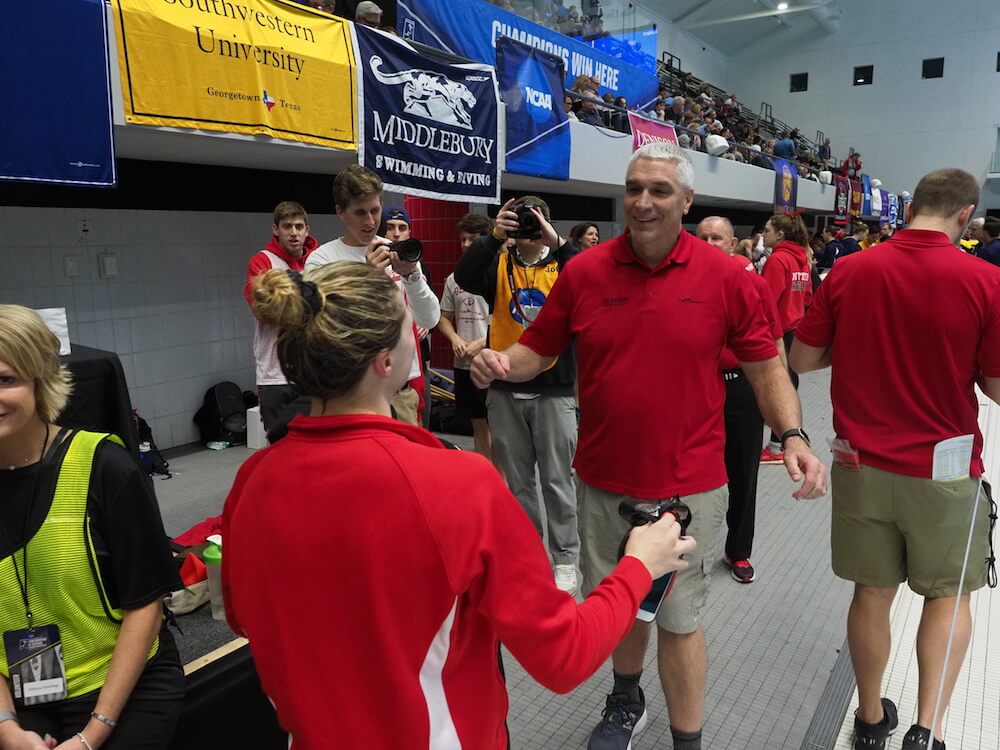Who Should Young Swimmers’ Role Models Be?

Who Should Young Swimmers’ Role Models Be?
As age-group swimmers, we often find ourselves looking up to the best in our sport. A great example is Michael Phelps. Many current swimmers grew up watching Phelps win gold medal after gold medal at the Olympic Games and World Championships. Naturally, we find ourselves wanting to be like him. We all want to find the highest level of success in our sport.
We might also find ourselves looking to success stories from our own teams or from our local area. Maybe it is the kid on your team who made Junior Nationals, or got into a Division I college. Their successes can be inspirational and, as someone you see regularly, they may help you believe that you can also reach your goals.
Of course, it is important for us to have people who we can look up to. They give us hope that success is possible. Furthermore, we can look to them to see the habits of elite athletes, and then try to replicate those habits in our own lives. The value of these things is undeniable, but is a person’s achievement level in swimming their only value as a role model?
After all, “success” in swimming can be hard to define and harder to achieve. Success is not just winning an Olympic gold medal. It can be getting a cut for a local meet, getting a best time, or even just stepping up to the blocks. These (admittedly smaller) successes are often overlooked in favor of those who reach the highest level. Once again, this is understandable from an outsider’s perspective. But for many of these other swimmers, they work just as hard to achieve their goals and have just as much to offer as those that reach the highest level.
Another thing to consider is how swimmers at the highest levels tend to make their stories have clear messages. Many professional athletes talk about how they trained really hard or worked on their confidence. But, although more have begun to do so, it is still very rare to hear these athletes honestly talk about their lowest points. This is especially important in a sport like swimming, where a missed taper can crush a whole season. With swimming, the training-time-to-reward ratio is lower than many other sports, which means that it is easier to lose sight of purpose and goals. And in times like those, messages such as “just work harder” tend to fall flat.
It is here where we should look more closely at who we are listening to. At the lowest points in the sport, it can be nearly impossible to take a message like this to heart. Instead, it becomes important to look to other teammates or coaches as role models. For example, while it is very unlikely that your coach was an Olympic medalist, they have been around the sport long enough to understand the highs and lows. People like this may not have experienced the very highest of highs in the sport, but they have chosen to stick around, give back and remain involved. These are the kinds of people that we need in our corner when we are at our lowest. They will understand best what we need in order to persevere through the toughest moments, because they have been through them just as well.
What this means for younger swimmers is that they should build close relationships with their older teammates as well as their coaches. These are the people who you will be able to count on. This will involve being open and honest with these people, so they can help you if need be. Also, it means learning from everyone around you, and not just about the type of swimmer you can be. The best coaches and teammates will also show you what kind of person to be away from the pool.
Certainly, it seems reasonable to only look up to the best. But only seeing their success can have a negative impact on us when we fail. Our role models need to come from all places, and they should be there with us when we need it. Swimming is not always about the results we put up in the pool, and it is important that we find role models who will help us in all aspects of life.
All commentaries are the opinion of the author and do not necessarily reflect the views of Swimming World Magazine nor its staff.



